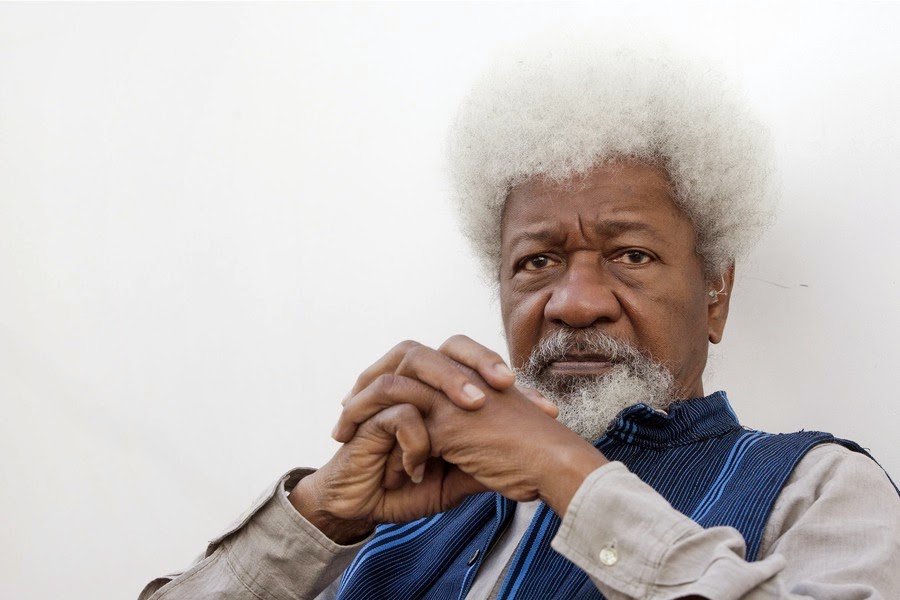Friday, May 9, 2014
Chimamanda Adichie, Wole Soyinka Named Among Africa's Greatest Innovators in Arts and Sciences
The National Geographic Innovator's Project has named Chimamanda Adichie, Wole Soyinka, and Babatunde Olatunji as Nigerians in their list of nine innovative Africans. asked distinguished professor Henry Louis Gates, Jr., director of the W. E. B. Du Bois Research Institute at Harvard University, to name some of Africa's top intellectual innovators. See their brief bios below...
Chimamanda Ngozi Adichie
Nigerian-born Adichie is the author of three novels, most recently the critically acclaimed Americanah. The book describes the affecting journey of a Nigerian woman who takes her chances in America as an emigrant, not because of poverty or hunger in her homeland, but to escape what she calls the "oppressive lethargy of choicelessness." The book is also a penetrating discourse on what it means to be black and how views of identity differ between African Americans and American Africans. In addition to her brilliant storytelling skills, Adichie has stepped into the realm of politics with her TED talk called "We Should All Be Feminists," said to have inspired the Beyoncé song "Flawless" and various opinion pieces. PHOTOGRAPH BY SUNDAY ALAMBA/ASSOCIATED PRESS
Babatunde Olatunji (1927-2003)Fascinated by African music from a young age, Nigerian drummer Olatunji helped pave the way for African music in the West. As a young man, he received a Rotary International Foundation scholarship that allowed him to attend Morehouse College in Atlanta, Georgia. At Morehouse, he organized a small group to play African music at school social events. After graduating as president of the student body, he studied public administration at New York University, where he started a small percussion group. Due to a lack of funds, he withdrew from the university and began to focus on music and give concerts, which led to him getting a job playing drums in a Radio City Music Hall production. It was not long before he was spotted by a Columbia Records producer and began releasing albums featuring traditional African music and hybrid compilations, winning him the enthusiastic acclaim of other jazz musicians. Olatunji was also a social activist, known for using the performance hall as his platform. PHOTOGRAPH BY WILLIAM JAMES WARREN/SCIENCE FACTION/CORBIS
Akinwande "Wole" Soyinka A Nigerian writer notable for his plays and poems, in 1986 Soyinka was the first African to be awarded the Nobel Prize in literature. Soyinka bases his writing on the mythology of his own Yoruba tribe and connects his plays to traditional African theater, dance, and music. Though he primarily considers himself a playwright, he has written novels and several volumes of poetry. After earning his doctorate in the United Kingdom, he worked at the Royal Court Theatre in London, where he wrote and produced plays. He later returned to Nigeria to study African drama, start an acting company, and teach literature and drama at the country's universities. For decades a strong proponent of Nigerian democracy, his works often focus on his criticism of Nigeria's many military dictators. He has been imprisoned and exiled, fleeing Nigeria in 1994 for the United States. Soyinka, who will turn 80 in July 2014, has taught at numerous U.S. universities, including Cornell, Emory, and Loyola Marymount. PHOTOGRAPH BY REX FEATURES/ASSOCIATED PRESS
Other women named in the list include Miriam Makeba (South Africa), Wangari Maathai (Kenya), and Nadine Gordimer (South Africa). The rest are Samir Amin (Egypt), Kwame Anthony Appiah (Ghana), and Loius B Leakey (Britain).
Source
Subscribe to:
Post Comments (Atom)




No comments:
Post a Comment
Click Post a Comment to share your thoughts, I'll love to hear from you. Thanks!
*Comments on old posts are moderated and may take sometime to be shown. That's just because I want to see them and respond to you if necessary.